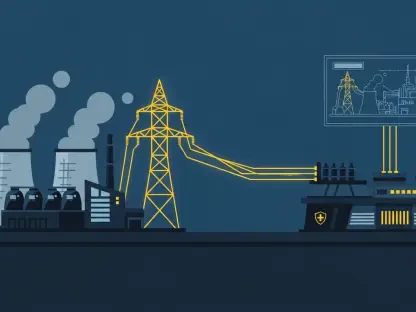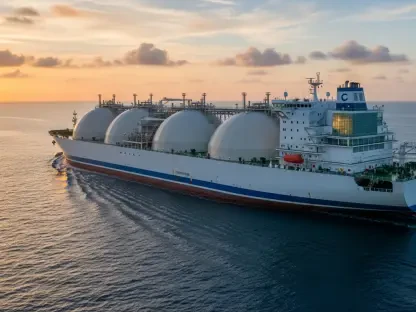In recent years, U.S. policy concerning Venezuela’s oil industry has undergone a remarkable transformation, driven largely by the shifting dynamics of international relations and domestic political priorities. At the heart of these changes lies state-run PDVSA and its foreign partners like Chevron, Eni, and Repsol, whose operations are essential for sustaining Venezuela’s oil market. The backdrop of U.S. sanctions, first imposed in 2019, underscores the complexities involved in maintaining economic pressure while ensuring that vital oil operations continue. Central to these modifications is the delicate balance of allowing limited oil operations and commercial exchanges without significantly empowering Nicolás Maduro’s government, a task that requires a keen understanding of geopolitical and economic imperatives.
Navigating a Strategic Shift in U.S. Policy
Refining Geopolitical Strategy
The past years have revealed a distinct evolution from the Trump administration’s stringent measures to a more adaptable approach towards Venezuelan oil. By offering targeted authorizations for foreign companies, the U.S. has signaled openness to maintaining operational continuity, even amidst sanctions. This is primarily done by permitting imports, which might be exchanged for Venezuelan oil as part of existing licenses. However, the condition remains firm: ensuring that Maduro’s government does not financially benefit from these transactions. Such a strategy enables foreign companies to sustain their operations while exerting economic pressure on the Venezuelan regime, striking an equilibrium between economic logic and political influence.
Support for opposition leaders in Venezuela continues to underpin American interventions, reflecting the tension-laden history between the two nations. As negotiations for oil licenses unfold, the guiding principle remains preventing cash flow to Maduro’s government. The role of U.S. Secretary of State Marco Rubio illustrates the high-level engagement in determining these authorizations’ scope. The objective is clear: operational facilitation for companies such as Chevron is encouraged, provided it does not translate into financial support for the regime, marking a rare occasion where strategic flexibility aligns with diplomatic goals.
Sustained Foreign Partnerships
Despite past restrictions and revoked licenses, the operations of Chevron and its counterparts in Venezuela’s oil industry demonstrate remarkable resilience. Following the imposition of sanctions, these corporations have persevered, indicating their critical role in ensuring the steady output of Venezuelan oil. This determination aligns seamlessly with the strategic shift observed in Washington, highlighting the symbiotic relationship between foreign partners and PDVSA. These operational stakeholders have played an indispensable role, providing the technological expertise necessary for PDVSA’s sustained performance even amidst economic sanctions.
Additionally, there’s an underlying challenge as seen in past mechanisms that allowed indirect financial gains for PDVSA through taxation and royalty compensation. This showcases the complexities of eliminating government access to oil proceeds while maintaining operational efficacy. The new licenses attempt to differentiate monetary flow from financial empowerment, but the U.S. faces ongoing challenges in aligning these intricately interwoven financial factors with its broader economic objectives concerning Venezuelan oil.
The Impact of Continued Foreign Cooperation
Collaborative Dynamics Amidst Sanctions
Chevron’s expressed intent to resume operations underlines the collaborative relationship between the Venezuelan state and foreign corporations amidst the global backdrop of sanctions. While this partnership indicates a form of accommodation, the implications extend beyond economic aspects. The readiness of both Venezuelan authorities and foreign partners to maintain operational continuity highlights the necessity of cross-border cooperation and understanding. This synchronization is mirrored in other facets of Venezuelan-American relations, underscored by exchanges such as prisoner swaps, which indicate a more nuanced diplomatic strategy aligning humanitarian and economic actions.
Moreover, the anticipated authorizations sought by Chevron and European firms such as Eni and Repsol reveal a multifaceted dimension to U.S.-Venezuela engagements. While these licenses allow swapping fuel supplies for Venezuelan oil, the broader trend in resource acquisition amidst political challenges becomes apparent. Their efforts reflect the necessity for resource access while simultaneously requiring strategic alignment with political motives. As these companies aim to circumvent direct monetary exchanges, spotlighting the realignment of objectives where operational feasibility counters geopolitical strategy is essential.
Balancing Economic and Political Imperatives
The U.S. efforts to navigate foreign partnerships amid sanctions underline a nuanced understanding of the politically charged landscape in Caracas. By allowing resource exchanges that alleviate PDVSA’s import cost pressures, the U.S. keeps Maduro’s government in check while maintaining operational continuity. These arrangements face inherent complexity in ensuring circumventing PDVSA’s indirect financial benefit through innovative operational models reflects a strategic recalibration. Ultimately, the objective of sustaining core oil industry operations while preventing Maduro’s government from wealth accumulation speaks to the intricate dance of political determination juxtaposed with economic pragmatism.
Foreign companies’ involvement in Venezuela’s oil sector paints a comprehensive picture, demonstrating the vital importance of integrative approaches while enhancing operational efficiencies. Their engagement reflects the broader strategic intention of keeping the industry vibrant without inadvertently re-empowering the regime, showcasing the myriad benefits of political adaptability married with economic realities.
Redefining the Future of Venezuela’s Oil Sector
In recent years, there has been a shift from the Trump administration’s strict policies to more adaptable approaches regarding Venezuelan oil. The U.S. has shown openness to maintaining operational continuity for foreign firms by offering specific authorizations, even under sanctions. This involves allowing imports that could be traded for Venezuelan oil under existing licenses. Importantly, the condition remains that Maduro’s government does not gain financially from these trades. This strategy allows foreign companies to continue operations while applying economic pressure on the Venezuelan regime, balancing economic logic with political goals.
U.S. support for opposition leaders in Venezuela remains crucial, reflecting the historically strained relations between the two countries. As oil license negotiations progress, the priority is to block any financial benefit to Maduro’s regime. The involvement of U.S. Secretary of State Marco Rubio shows the high-level focus on defining these authorizations. The goal is to facilitate operations for companies like Chevron, ensuring no financial support reaches the regime, thus aligning strategic flexibility with diplomatic objectives.









